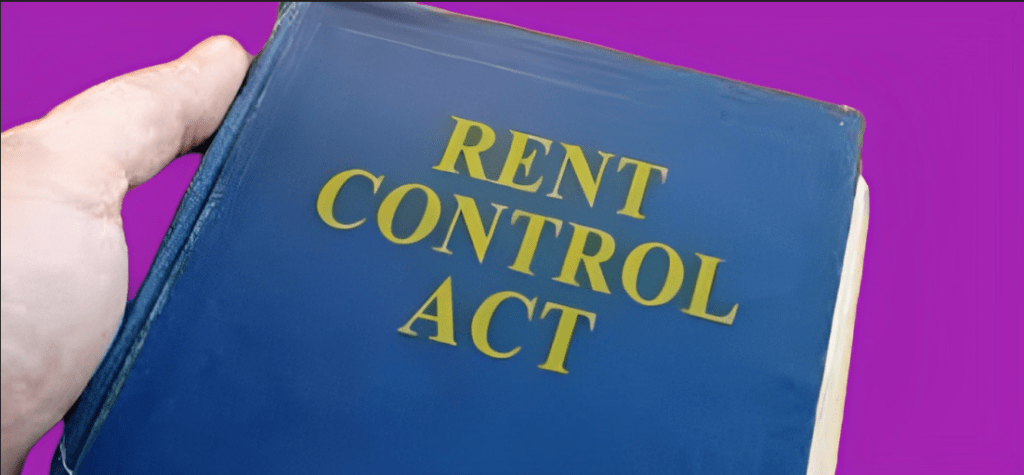
This article is written by Sonam Kumari of 2nd Semester of Hidayatullah National Law University
ABSTRACT
This research paper examines the execution of orders under the Rent Control Act, focusing on the challenges faced by landlords and tenants in implementing and enforcing these orders. The study aims to provide a comprehensive analysis of the legal framework governing the execution process, identify common issues encountered by parties involved, and propose effective remedies to address these challenges.
The paper begins by providing an overview of the Rent Control Act and its significance in regulating tenancy relationships and protecting the rights of both landlords and tenants. It discusses the objectives and key provisions of the Act, emphasizing the importance of executing orders to ensure compliance and fair resolution of disputes.
KEYWORDS
Execution order, rent control act, tenant, dissolution, eviction.
INTRODUCTION
Rent control acts are regulations enacted by governments to protect tenants from excessive rent increases and ensure housing affordability. These laws empower authorities to issue orders governing various aspects of rental properties, such as rent levels, eviction procedures, and property maintenance. The execution of these orders plays a crucial role in maintaining a balance between tenant protection and landlord rights. In this article, we will explore the execution of orders under rent control acts and delve into the key considerations involved.
UNDERSTANDING RENT CONTROL ACT
Rent control acts are designed to regulate the rental market and provide stability for tenants. These acts typically empower regulatory bodies to set maximum allowable rent increases, limit eviction grounds, establish standards for property maintenance, and oversee dispute resolution processes. The execution of orders under rent control acts involves implementing and enforcing these regulations to safeguard tenant rights.
The legislature enacted a national Rent Control Act in 1948. ([1]) It controls the guidelines for renting out a property and makes sure neither the rights of the landlords nor the tenants are violated by the other. It should be noted that each state currently has its own Rent Control Act, and while they are generally similar to one another, they do have a few small variations.
The 1948 Act’s strict requirements and pro-tenant stance have made it impossible for the real estate sector in some regions to expand. Despite inflation and rising property values, some properties that have been rented out since 1948 continue to pay the same amount of rent.
In an effort to prevent the property’s value from declining, the Central Government attempted to change the Act in 1992 through a proposed model. The sitting tenants unfortunately resisted the adjustments; therefore, they did not go into effect.
CHARACTERISTICS OF THE INDIAN RENT CONTROL ACT
The Rent Control Act’s objectives are to control rental price growth and protect both tenants’ and landlords’ rights. The following list includes some of the rent Control Act of India’s key components:
Different regulations have been passed as a result of the Rent Control Act, and these rules are crucial in assisting the renter in locating a specific property for the purpose of housing.
The Rent Control Act has created a reasonable level of control over the rents that the landlord may charge a tenant for a specific property.
The Rent Control Act gives tenants the security of not being forcibly evicted by a landlord unless there are exceptional circumstances.
TYPES OF ORDERS UNDER RENT CONTROL ACT
a. Rent Adjustment Orders: One of the primary functions of rent control acts is to regulate rent levels. Authorities may issue orders to adjust rents based on various factors such as inflation, maintenance costs, or changes in the rental market. The execution of these orders ensures that landlords adhere to the prescribed rent limits and prevents excessive rent hikes.[2]
b. Eviction Control Orders: Rent control acts often place restrictions on landlords’ ability to evict tenants. Authorities may issue orders specifying valid reasons for eviction, defining the eviction process, or establishing timelines for notice periods. The execution of these orders ensures that landlords follow the prescribed procedures and prevents unjust evictions.
c. Maintenance Orders: Another vital aspect of rent control acts is ensuring that rental properties are maintained in a habitable condition. Authorities may issue orders to landlords, directing them to address maintenance issues, make necessary repairs, or improve living conditions. The execution of these orders ensures that tenants are provided with safe and liveable accommodations.
RENTAL AGREEMENT
In India, there are a number of norms and regulations that must be followed while renting or leasing any property for either residential or commercial use. These include: According to the legislation, a formal agreement between the two parties outlining all of the tenancy’s terms and conditions is required.
In the following circumstances, an agreement formed without being explicitly set forth in writing is not a binding contract:
a. All alterations, regardless of the nature of the correction, must be documented in writing.
b. Both the landlord and the renter, together with a date, must sign the contract.
c. The contract needs to be registered and stamped.
d. Without a legally binding rental agreement, neither the tenant’s obligations nor the landlord’s rights can be enforced or safeguarded.
As a result, it is usually advisable to get the assistance of a legal professional when creating such an agreement due to the numerous complications involved, especially in commercial leasing. ([3])
ROLE OF REGULATORY BODY
Regulatory bodies, such as rent control boards or housing agencies, play a pivotal role in executing orders under rent control acts. These bodies are responsible for receiving complaints, conducting hearings, and issuing orders based on the evidence and regulations outlined in the rent control acts. They ensure that both tenants and landlords have a fair opportunity to present their case and that the orders are enforced.
RIGHTS OF A TENANT
The Rent Control Act was created to safeguard both tenants’ rights as well as those of landlords and their property. The Act grants the tenant a few key rights, including the following:
- RIGHT AGAINST UNFAIR EVICTION: In accordance with the Act, the landlord is not permitted to remove the tenant without good cause or justification. Each state has a slightly different set of eviction laws. In some places, the landlord must go before the court and request a court order before they can evict a tenant. If the renter is ready to accept any adjustments to the rent, he or she cannot be evicted in several states.
- FAIR RENT: The landlord is not allowed to demand excessive rent while renting out a home. A rental property’s appraisal must take its value into consideration. The tenant may go to court to seek relief if they believe the amount of rent being requested is excessive given the worth of the property. Typically, the rent should range from 8% to 10% of the total value of the property, which includes all costs associated with building and property improvements.
- VITAL SERVICES: The renter has a fundamental right to use vital services like power and water supply. Even if the renter has not made rent payments for the same or a different property, the landlord does not have the right to terminate these services.
RIGHTS OF A LANDLORD
The property is always the focal point of a rental agreement, and it must be safeguarded from unjust exploitation. The following rights belong to the landlord under the Rent Control Act:
- RIGHT TO EVICT: In most of the cases it is necessary for the landlord to provide an advance notice to the tenant before going to the court if he wants the eviction. But this right varies from state to state as in few state one can get the house evicted if he wants it for personal and legitimate reason but in Karnataka it is not possible.
- CHARGE RENT: As the owner of the land, the landlord is entitled to charge rent to a tenant. As there is no legal law establishing a cap on rent, the landlord is free to keep raising the rent fees as he sees fit. Therefore, it is prudent to include the amount of the increase and the conditions of the increase in the rental agreement itself in such circumstances. The rent often goes up by 5% to 8% on a yearly basis.
- TEMPORARY REPOSESSION OF PROPERTY: The landlord has the right to temporarily take back possession of the property in order to repair, change, or improve it. However, such alterations to the property must not do the tenant any harm or seriously interfere with his tenure.
AREAS WHERE RENT CONTROL ACT IS NOT APPLICABLE
When a property has been rented out, there are some circumstances in which “the Rent Control Act” is not applicable. As follows:
A. Real estate that has been leased to “private limited or public limited firms” having a paid-up share capital of at least “Rs 1 crore”.
B. Real estate that has been leased or subleased to banks, public sector enterprises, or any other organisation created by a state or federal law.
C. Leasing real estate to foreign businesses, missions, or organisations.
WHAT DOES ILLEGAL EVICTION OF TENANTS MEAN ACCORDING TO THE RENT EVICTION LAW INDIA?
The Rent Eviction Law in India states that an illegal eviction of tenancy takes place when a landowner forbids a tenant from entering a rental property or removes the tenant’s possessions from the property using force, intimidation, or other methods (like turning off the utilities or changing the locks). However, the landowners are breaching the law if they remove you without taking the required legal steps.
There are many instances where a landlord wilfully submits a legal notice of eviction. However, the renter is given a remedy in each of these situations by the rent control statute.
PROCESS FOR RENTING COMMERCIAL PROPERTY
Since there is fierce internal rivalry in the Indian real estate market, rent agreements must be carefully negotiated. You must be aware of all the laws that are most appropriate for your business and the appropriate questions to ask.
- VERIFYING TITLE OWNERSHIP
It is very important to have knowledge about the ownership of the property before entering in contract. Before entering into the contract its prudent to check if there is any sub-rent or extra charges attached to the property.
- POWERS OF ATTORNEY (PoA) AND SANCTIONED PLANS
It is generally essential to check the title deed and commencement certificate given by the relevant authorities if the property you are renting is a building under construction. Make sure to verify the occupation certificate before renting out commercial space in a built-up property. In the case of indirect rent, it’s also crucial to verify whether any kind of power of attorney is in play.
- A SUITABLE RENTAL AGREEMENT
It is important to take care that the essential of the agreement are adequate and based on operations before entering into mutual commitments. It is essential to check for which purpose the person is entering into rental agreement.
- MORTGAGE AND INCOME TAX VERIFICATION
In the event of a business agreement, it is usually advisable to investigate the landlord’s income tax history to see whether there are any unresolved issues or illegal activities. This will also confirm to you whether the aforementioned property is classified under the “Development Control Regulations of the Income Tax Act of 1961” as “commercial” or “residential.” If there is any doubt regarding this classification, you might later be assessed a TDS.
- PROPERTY AGENT’S BACKGROUND CHECK
Before hiring a real estate agent, it’s crucial to research his reputation. Past rental agreements and word of mouth are other good ways to learn more about the brokers. Demand that the agents provide information on previous clients they have served. Their reluctance to do so may be a blatant sign of past dishonest behaviour, if any.
- RENT AGREEMENT VALIDITY
A business leasing agreement must have the following key details in addition to other clauses:
- Dates for the start and end of the rental agreement,
- the location of the property,
- the total rental cost,
- details about the security deposit.
- Payment Scattered
- Lease renewal conditions
- The names of each party and their signatures are included.
HOW SHOULD A COMMERCIAL RENTAL AGREEMENT BE USED?
Each party, including the guarantor, shall receive a copy of the finished document. Given the length of the paper, each side should be given the chance to read it, which could take some time.
- Each state has access to “non-judicial stamp paper” or “e-stamp paper,” which is required for printing the Commercial Rental Agreement. The ‘duration’ of the Rent and the state in which it is implemented would determine the value of the stamp paper.
- After printing the Rental Agreement on stamp paper or electronic stamp paper, as appropriate, both parties must sign it. Additionally, a copy of the Commercial Rental Agreement should be kept by each party.
- The Commercial Rental Agreement must be registered if the rental length is longer than 11 months. For the purposes of registration, both the lessor and the lessee must visit the sub-registrar’s office.
GROUNDS FOR EVICTION OF TENANT UNDER INDIA’S RENT EVICTION LAW
According to Indian rental law, landlords are permitted to file an eviction lawsuit against a tenant if they have sufficient, legal justification. The following reasons may be used to evict a renter in India:
- The renter intentionally postponed paying the agreed-upon rent by more than 15 days.
- Without notifying the landlord or making an official request, the tenant has leased a rental property to a third party.
- The tenant has made use of the rental property for improper uses or for purposes not covered by the rental agreement.
- The renter has done any actions that have reduced the value or utility of the property.
CHALLENGES AND CONSIDERATIONS
a. COMPLIANCE AND ENFORCEMENT: The execution of orders under rent control acts can face challenges in terms of compliance and enforcement. Some landlords may resist implementing the orders, leading to potential conflicts or legal disputes. It is crucial for regulatory bodies to have adequate mechanisms in place to monitor compliance and enforce the orders effectively.
b. BALANCING TENANT AND LANDLORD INTERESTS: Rent control acts aim to strike a balance between protecting tenants and respecting landlord rights. Executing orders under these acts requires considering the interests of both parties. While tenants need affordable housing and protection from arbitrary rent increases, landlords require a fair return on their investment and the ability to manage their properties effectively. Striking a balance that benefits both parties is a key consideration during the execution of orders.
c. LONG-TERM HOUSING MARKET IMPACT: Rent control acts and the execution of orders can have long-term implications for the housing market. While these acts provide immediate relief to tenants, they may also impact housing supply, investment in rental properties, and overall market dynamics. Careful analysis and periodic evaluations of the rent control measures and executed orders are necessary to assess their long-term effects.
CONCLUSION
The execution of orders under rent control acts is a complex process aimed at ensuring tenant protection while respecting landlord rights. Rent adjustment orders, eviction control orders, and maintenance orders are essential tools used to implement these acts effectively. Regulatory bodies play a crucial role in executing these orders and maintaining a fair balance between tenants and landlords. However, it is, important to address challenges related to compliance, enforcement, and balancing the interests of both parties.
The execution of orders under rent control acts requires cooperation and collaboration between tenants, landlords, regulatory bodies, and other stakeholders involved in the rental housing market. Clear communication, transparent processes, and a fair dispute resolution mechanism are vital to ensure the smooth execution of these orders.
Furthermore, it is essential for regulatory bodies to provide adequate resources, such as trained staff and sufficient funding, to effectively enforce the orders. Regular inspections and monitoring of rental properties can help identify non-compliance and ensure that landlords adhere to the prescribed regulations.
Balancing the interests of tenants and landlords is a delicate task. Rent control acts aim to provide affordable housing options for tenants while allowing landlords to maintain a reasonable return on their investment. The execution of orders should consider the financial viability of rental properties, the cost of maintenance and repairs, and the overall impact on the housing market. Striking a balance that protects tenants from exploitation and ensures the sustainability of the rental market is crucial.
It is also important to evaluate the long-term effects of rent control acts and the execution of orders. While these measures offer immediate relief to tenants, they may impact the supply of rental housing. Stricter regulations and limitations on rent increases may discourage landlords from investing in rental properties, potentially leading to a decrease in available housing options. Regular assessments of the rental market and the impact of executed orders can help policymakers fine-tune the regulations and strike a balance between affordability and housing availability.
In conclusion, the execution of orders under rent control acts plays a critical role in upholding tenant rights, regulating rent levels, and maintaining livable housing conditions. Regulatory bodies and stakeholders involved must work together to address challenges related to compliance, enforcement, and balancing the interests of tenants and landlords. By ensuring effective execution of these orders, societies can achieve a fair and sustainable rental housing market that benefits both tenants and landlords alike.
“[1] Cleartax, https://cleartax.in/s/rent-control-act (last visited 20th June 2023)”
“[2] Magicbricks, https://www.magicbricks.com/blog/rental-control-act–rental-agreement-rights-of-tenant-and-landlord/118851.html (last visited 20th June 2023)”
“[3] Indiafillings, https://www.indiafilings.com/learn/rent-control-act/ (last visited 20th June 2023)”




0 Comments